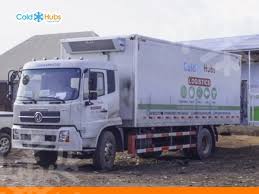![]()
If you’ve landed on this article page, you’re probably searching for a
good business idea—an idea that’s light on the pocket but heavy on
returns, promising both a fulfilling journey and potential profit.
|
How to start Agricultural Logistics Service Business in Nigeria
The agricultural supply chain is a complex one faced with many
issues. Those involved in the process range from farmers,
producers, manufacturers, and consumers. Due to the multiple
processes and persons involved, it has become even more
difficult to manage and control. Farmers have to deal with
getting their agricultural products through these processes.
However, in a country like Nigeria where bad road networks are a
major challenge, efficient mobility of agricultural products to
its end users has become one of the bottlenecks besieging the
agricultural industry. Whether it is transportation, inventory
taking, or warehousing, the idea boils down to this one thing:
there remains a gap for agricultural logistics companies in
Nigeria.
Agricultural logistics companies are much needed in Nigeria.
Having an external logistic company to manage your agro
logistics can be more effective than handling them yourselves
(especially if you don't have a team with the required skills
and experience yet). It is important to choose a logistics
company that offers services tailored to your farm's specific
needs.
Food is primal among social amenities. More so, between the farm
and the final consumer, agricultural logistics companies in
Nigeria can be culled "essential services" in the light of
several factors such as customer satisfaction and including the
looting of palliatives during the COVID-19 pandemic in 2020.
Develop a polished brand identity that conveys expertise, trust,
and a passion for supporting Nigeria’s agricultural sector. Your
business name, logo, color palette, and other elements will
represent and differentiate your company.
Consider including keywords like “agriculture,” “logistics,”
“solutions,” or “services” in your name. Check name availability
to secure social media profiles, domains, and trademarks
associated with your brand.
Designing an Impactful Website
Have a modern, mobile-friendly website built to engage prospects
and explain your services. Share expertise through informative
content like service descriptions, client case studies, blogs,
and resources.
Include clear calls-to-action to contact your company or request
a quote. Optimize site speed and technical elements for SEO
performance. Use Google Analytics to monitor traffic and
fine-tune your strategy.
Setting Your Agro-Logistics Rates
When pricing services, consider your costs, the value delivered
to clients, and competitive rates in the market. Common
agro-logistics fee structures include:
Per mile, weight, or volume transported
Flat fees for routine routes
Tiered warehousing rates based on space and services
Value-added service fees: crating, return processing, etc.
Minimum monthly or annual commitments
Custom project pricing based on unique needs
Offer tiered pricing for different service levels. Bundle
discounted packages for larger, long-term clients. Maintain
flexibility to be accessible.
Building a Reliable In-House Team
Assemble an experienced team covering key functions like:
Transportation: drivers, dispatchers, route analysts
Warehousing: managers, pickers/packers, inventory crew
Equipment maintenance: mechanics, parts sourcing
IT/Systems: TMS, WMS, ERP Optimization
Sustainability: Initiatives and Coordination
Quality control: inspectors, auditors
Hire employees or independent contractors suited for each role.
Favor individuals with real-world agro-logistics experience.
Investing in essential equipment
Make key equipment investments like:
Vehicles: trucks, trailers, and vans suited for farm roads and
rural areas. Prioritize fuel efficiency and cold chain hauling
capability. Buy used to conserve capital initially.
Warehouses and hubs: strategically located climate-controlled
facilities with ample capacity near target markets and routes
Consider leasing flexible warehouse space when starting out.
Loading and unloading: pallet jacks, forklifts, and conveyors to
quickly handle goods
Supplies: pallets, crates, dunnage, shrink wrap, cooler
blankets, and other specialized supplies to protect cargo.
Technology: TMS, WMS, ERP, barcode scanners, tablets, dash cams,
GPS
Proper maintenance and sanitization procedures will maximize the
longevity of equipment. Upgrade wisely as operations grow.
Establishing Efficient Operations Systems
Create documented processes, tools, and standards to streamline
operations as you scale:
Client onboarding: needs analysis, contracts, kickoff
Route planning: mapping, load building, dispatch
Inventory management: tracking, auditing, and cross-docking
Freight tracking and real-time status communication
Fleet oversight: maintenance, telematics monitoring
Billing and payment: invoicing, rate negotiation, collections
Performance analytics: KPI monitoring, identifying improvements
Regularly gather team input to improve systems. Automate
administrative tasks where possible.
Providing Outstanding Client Experiences
Make each interaction exceptional by:
Maintaining clear communication and prompt responses
Proactively sharing ideas and industry information
Consistently meeting or beating service commitments
Continuing process improvements
Requesting feedback on satisfaction
Helping clients maximize supply chain efficiency
Establish yourself as a strategic partner, not just a vendor.
Offering premium touches like farm visits also makes a memorable
impact and builds rapport.
Pursuing strategic logistics partnerships
Partner with specialists to expand capabilities.
Carriers: LTL, FTL, intermodal, and refrigerated partners
International freight forwarders: To enable exports
Co-packers and processors: for value-added services
IT/software firms: To enhance systems integration
Equipment maintenance: for optimal uptime
Choose partners who share your service standards and strengthen
your offerings. Formalize referral relationships.
With dedication and strategic planning, Nigeria’s booming
agriculture sector can support a thriving agro-logistics
enterprise. By relentlessly focusing on delivering value to your
clients, you can build a rewarding career in this essential
field.
Get our Practical Guide on How to set up an Agricultural
Logistics Service
in Nigeria. This comprehensive guide will walk you through the
fundamentals of starting and running a successful Agricultural
Logistics Service in Nigeria, from initial planning to
profitability. We’ll cover key factors like identifying
in-demand niches, establishing a strong brand, marketing
effectively, optimizing operations and delivering an exceptional
student experience.
|







